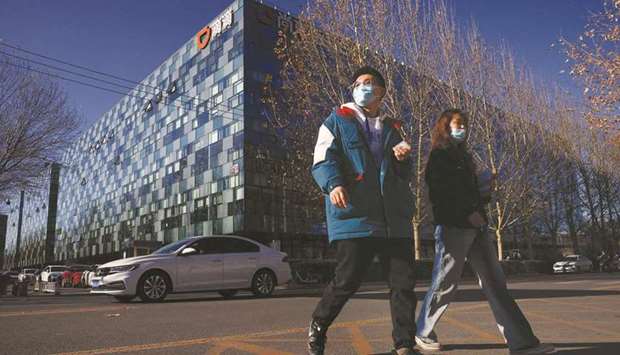Didi Global Inc began preparations to withdraw from US stock exchanges, a stunning reversal following demands from Chinese regulators that had opposed its American listing.
The ride-hailing giant’s board has authorised the company to file for a delisting of its American depositary shares from the New York Stock Exchange, it said in a statement on Thursday. It will pursue a listing in Hong Kong and ensure that the US stock will be convertible into freely tradable shares on another internationally recognised stock exchange.
Didi is aiming to file for the Hong Kong listing around March, people with knowledge of the matter said, asking not to be identified as the plans haven’t been made public. Based on the normal process in Hong Kong, it could aim for a summer listing if everything goes smoothly.
There remains a large amount of uncertainty over the potential terms of the delisting. Shares in Didi jumped more than 16% to just over $9 after the announcement in Friday premarket trading, still well below its $14 debut level, before erasing most gains.
The unprecedented move underscores the depth of Beijing’s concern about the potential leakage of sensitive data to its geopolitical rival, as well as the extent to which the government will go to punish Didi for contravening its wishes. Chinese regulators had asked Didi’s top executives to devise a plan to delist from US bourses because of concerns about leakage of sensitive data, Bloomberg reported last week.
SoftBank Group Corp, the firm’s largest minority shareholder, dropped as much as 3.1% in Tokyo yesterday before paring losses. Chinese tech shares briefly touched record lows in Hong Kong, extending a rout that has wiped out about $1.5tn of combined market value from the Hang Seng Tech Index since a February peak.
“Didi’s plans to sell shares in Hong Kong and delist in the US reduces risk of a messy, forced delisting by regulators in both China and the US and may signal that Chinese authorities’ crackdown on it has peaked. The company’s statement bolsters our view that a Hong Kong IPO will come before a US delisting, with a seamless conversion of ADSs into Hong Kong-listed shares,” says Matthew Kanterman and Tiffany Tam, analysts at Bloomberg. Despite the rally, Didi remains down more than 40% from its IPO - a stark reminder for investors of the risks of betting on Chinese stocks during an increasingly heavy-handed Xi Jinping administration. The way Beijing has gone after not just Didi but a swath of internet firms makes it clear the government will prioritise national interests at the expense of global investors.
Several of Didi’s most influential and longest-running backers said they weren’t consulted on the plan and learned of the delisting decision through an official Didi blogpost yesterday, people familiar with the matter said. That’s unusual in China’s corporate world, where stakeholders are often pinged systematically for feedback.
The company put out its statement after meeting with regulators, and after Bloomberg News reported on the impending move last week, one of the people said, asking not to be identified speaking about a sensitive matter. Didi’s board convened on Thursday and made their snap decision then, another person said.
Representatives for the company didn’t immediately respond to requests for comment on its Hong Kong listing timeframe or the meetings.
The Beijing-based firm sparked the ire of authorities when it proceeded with its New York stock offering this summer, despite requests that it ensure the security of its data before the IPO.
Regulators placed the company under a cybersecurity review days after its debut, removed its services from domestic app stores and has since asked Didi to work on plans for a withdrawal from the NYSE.
Didi executives had considered proposals including a straight-up privatisation or a share float in Hong Kong followed by a delisting from the US, people with knowledge of the matter told Bloomberg.
If the privatisation proceeds, the proposal will likely be at least the $14 IPO price since a lower offer so soon after the June initial public offering could prompt lawsuits or shareholder resistance, the people had said.
If there is a secondary listing in Hong Kong, the IPO price would probably be a discount to the share price in the US.
Didi’s decision follows mounting pressure from both Washington and Beijing on the universe of Chinese companies listed in the US, from its biggest tech giants to old-economy stalwarts like PetroChina Co.

People walk past the headquarters of Didi in Beijing. The ride-hailing giant began preparations to withdraw from US stock exchanges, a stunning reversal following demands from Chinese regulators that had opposed its American listing.
